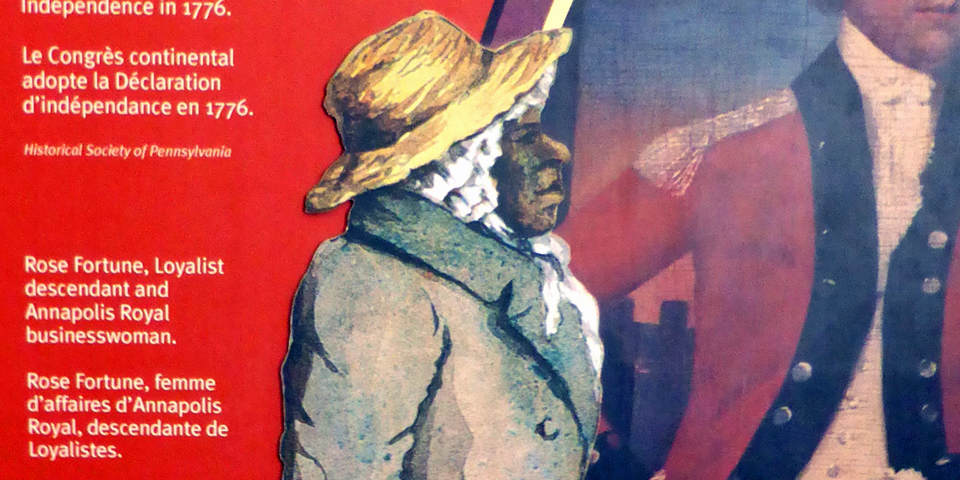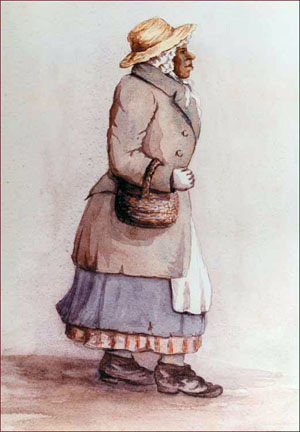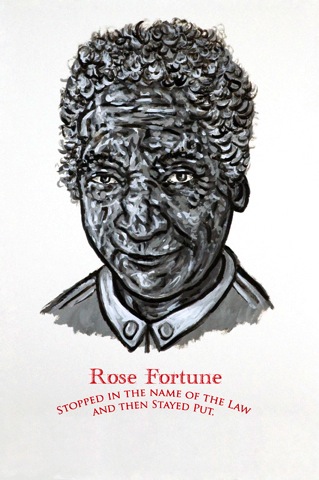Rose Fortune (March 13, 1774-February 20, 1864), a Black Loyalist originally from the US, is best-known for her talent as a businesswoman at a time when neither women nor Black persons were encouraged to pursue entrepreneurial opportunities and when the feminist movement in Canada was decades away. Born in Virginia during the American Revolution to enslaved persons, Fortune emigrated to Canada at age ten. Her family settled in the Annapolis Valley in Nova Scotia, a popular destination for black Loyalists.
Rose does not appear by name in any of the extensive rolls of Blacks aboard ships leaving American ports at the conclusion of the war in 1783. She is, however, likely to be the only child aged ‘over 10 years of parents “Fortune and wife”, listed as “Free [Blacks]” in the muster roll taken at Annapolis Royal in June of 1783.
A well-known image of her from a watercolour of about 1830 depicts her in middle age. Wearing men’s boots, a man’s overcoat over a dress and apron, and a straw hat on top of the lace cap tied under her chin, she carries a straw basket, and is every bit the picture of firm resolve. Some twenty years later, a Lieutenant-Colonel Sleigh of the 77th Regiment wrote of a chance encounter with Rose in 1852:
“I was aided in my hasty efforts to quit the abominable inn by a curious old Negro woman, rather stunted in growth…. and dressed in a man’s coat and felt hat; she had a small stick in her hand which she applied lustily to the backs of all who did not jump instantly out of the way. Poor old dame! She was evidently a privileged character.”
Details of her early life in town are a mystery. Despite extensive documentation for a number of other Black Loyalists of her generation in St. Luke’s Church of England records, there is no mention at all of her parents and the only record of Rose is her burial on Feb. 20, 1864, “age unknown, supposed about 90”. There are no baptismal records locally for any of her children, although their marriages are recorded in St. Luke’s register. This would seem to suggest that her early years may have been spent elsewhere, perhaps in a centre like Saint John, New Brunswick, where a number of Blacks from Digby had settled. She appears neither in the deeds record nor the early census returns.
As late as 1838, Rose was apparently not living independently. The Nova Scotia census for that year, which lists only heads of households, makes no reference to Rose Fortune. In her old age, she reportedly lived near the Union Bank, now the Royal Bank of Canada.
Although they were granted freedom from enslavement, earning a living was difficult for black Loyalists who came to Canada. Yet, over time Fortune developed two lucrative businesses in the area. She began working as a baggage carrier, transporting luggage and provisions from ships, which she would deliver in her wheelbarrow. Later, she implemented a rudimentary “wake-up call” service in which she would alert people at nearby inns in danger of missing departing ships. Fortune also imposed and enforced curfews at the wharves and the surrounding area, hence enforcing the law at early Annapolis Royal. Many consider her the first policewoman in Canada.
Rose had at least three children. Daughter Jane Fortune married Isaac Godfrey, son of Black Loyalist Edward Godfrey, on December 21, 1830. Isaac and Jane Godfrey had no children and are buried in the Garrison cemetery at Fort Anne. Their tombstones stand near the entrance to the Court House and are perhaps an indication of Rose’s final resting place.
Rose’s son John Fortune married Hester Godfrey, sister of Isaac, on January 13, 1838, and lived in the Annapolis Royal area. John Fortune was dead by the time of the 1871 Canadian census, but his widow, Hester, lived to a great age, and was living in the household of a granddaughter at the time of the 1901 census. John and Hester Fortune had at least two children. A son, George, died in childhood. Daughter Joanna Fortune married George Moses on February 27, 1862. He was the grandson of Rose’s contemporaries, Aesop Moses and John Prior. George and Joanna had four sons and two daughters and, although the Moses surname is no longer found in the area, their descendants include some members of the local Burrill, Currie, Bailey and Stevenson families.
Sources:
http://www.thecanadianencyclopedia.ca/en/article/rose-fortune/
http://www.annapolisheritagesociety.com/history-pers-fortune.html






1 comment
Quite notable and scholarly orchestrated….in design and content….Gloria Jean